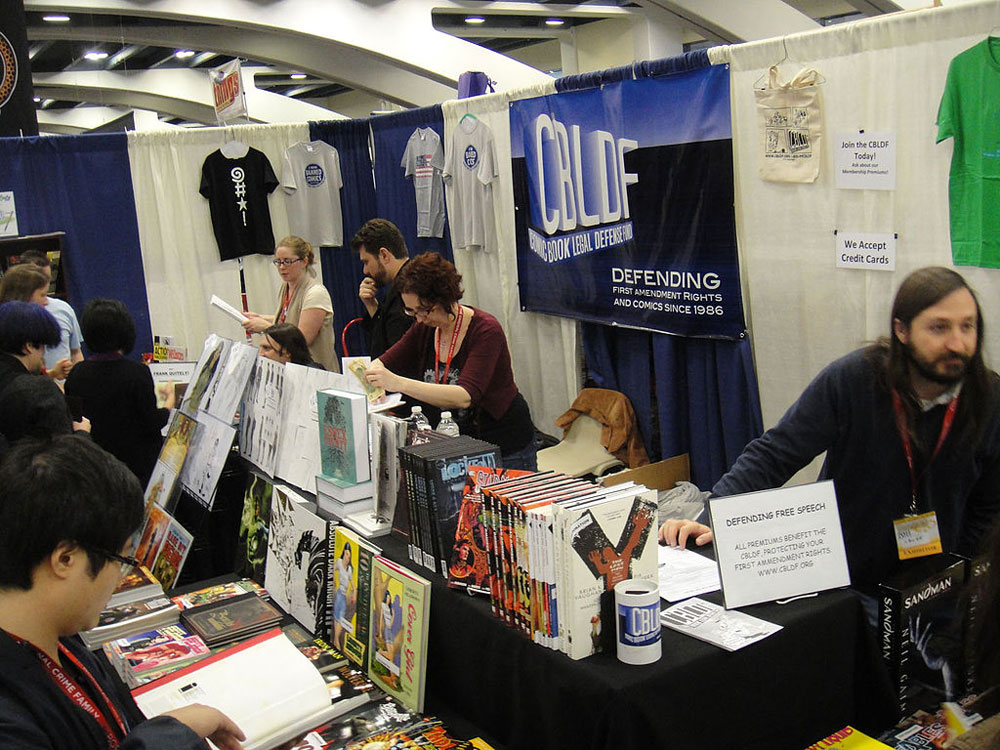
August 13, 2020; Publishers Weekly and the Hollywood Reporter
The Comic Book Legal Defense Fund (CBLDF) has announced Jeff Trexler as its interim executive director. Trexler replaces Charles Brownstein, who served as executive director for 18 years, after Brownstein resigned in June amid renewed allegations of sexually assaulting comics creator Taki Soma in 2005.
Founded in 1986 by comics creator and publisher Denis Kitchen, CBLDF is “a nonprofit organization dedicated to the protection of the First Amendment rights of the comics art form and its community of retailers, creators, publishers, librarians, and readers.” It’s grown from its roots in the comics community into an influential free speech watchdog. It provides legal services and representation for free speech litigation and has emerged in recent years as a champion of libraries challenging censorship efforts.
Brownstein joined CBLDF as executive director in 2002. His resignation comes as women continue sharing experiences of sexual harassment, assault, and abuse by male professionals in the comics industry. Aside from Soma’s initial charge of assault at a comics convention in 2005—an encounter Brownstein recounted from his perspective in a 2006 statement and for which he was reportedly disciplined but not fired—comics professional Kris Simon recently came forward to share her own experiences with Brownstein. Former CBLDF Development Manager Cheyenne Allott also spoke out after her release from a 2010 non-disclosure agreement. The Comics Journal has extensively investigated both Soma’s 2005 account and Allott’s testimony, the latter of which details years of problem behavior from Brownstein and a lack of board oversight.
CBLDF’s board nonresponse has alienated supporters and highlighted concerns with the organization’s structure, policies, and procedures. Three board members have retired or resigned since Brownstein’s departure: Paul Levitz, a former president and publisher at DC Comics; Jeff Abraham, president of Penguin Random House Publisher Services; and Katherine Keller, a librarian at the University of Nevada Las Vegas’s College of Education.
Even now, the response has been wanting. The June press release regarding Brownstein’s resignation was formal and rote, omitting Brownstein’s reasons for leaving. Subsequent press releases sought to address what CBLDF itself characterized as “stilted and clumsy” communications. Speaking to The Hollywood Reporter, CBLDF President Christina Merkler’s attempt to explain the board’s inaction reads more like an abdication of responsibility than an admission of failure:
The current board was not aware of the details of Taki Soma’s allegations, nor the recent accusations by previous employees. It’s sometimes easy to overestimate how a volunteer board like the CBLDF operates. We meet a handful of times a year to discuss projects, assign subcommittees, oversee fundraising, and provide advice and consent on budgets. The 2005 incident was investigated and handled as a human resources issue [in 2006]. Does that mean that in the 14 years since, the nature of our board’s operations created some gaps in oversight? I think that’s obvious and it’s at the heart of what we’re addressing now.
Sign up for our free newsletters
Subscribe to NPQ's newsletters to have our top stories delivered directly to your inbox.
By signing up, you agree to our privacy policy and terms of use, and to receive messages from NPQ and our partners.
Still, Merkler and the board are soliciting feedback from anyone with “stories to tell” and her insistence that CBLDF will work to make amends for 14 years of negligence appears genuine. Appointing Trexler is an obvious start: Tasked with restoring the organization’s credibility, he has a background in ethics and advised government officials on sexual harassment legal reform as the associate director of the Fashion Law Institute. Trexler further outlined his vision for next steps in a note to supporters.
But even with a leadership change, rebuilding trust in CBLDF will be an uphill climb. The organization has seen an exodus of comics professionals and individual supporters who’ve publicly disavowed it. Corporate members, including publishers Boom! Studios and Dark Horse Comics, have dropped from the organization’s website.
“I’m feeling pretty pessimistic about the CBLDF’s ability to change,” said comics artist Tyler Crook. “I think our industry might be better served with a new organization built on stronger foundations and with a stronger moral compass.”
While Merkler argues the current board had no knowledge of the allegations toward Brownstein nor the use of nondisclosure agreements to gag former employees, it doesn’t absolve them of complicity. Further, Merkler’s statements to the Hollywood Reporter claiming innocence due to board members’ limited level of engagement diminish the value of the nonprofit’s board of directors.
It doesn’t have to be that way. Writing for NPQ in 2018, Anne Wallestad, president of BoardSource, analyzed the board’s role in addressing situations involving alleged sexual misconduct of leaders.
“The board has a very important role in providing leadership and oversight of the entire organization, including protecting one of its most important resources—its people,” she wrote. “That is a serious responsibility that calls on boards to go beyond compliance-driven policies and think more deeply about how to cultivate an organizational culture that refuses to tolerate harassment or exploitation of any kind.”
As with many of the transitional pains the sector is experiencing as it grapples with COVID-19 and racial injustice–and sexual misconduct, too—the time is now to reevaluate, rebuild, and establish better systems that hold toxic behavior immediately accountable.—Drew Adams












